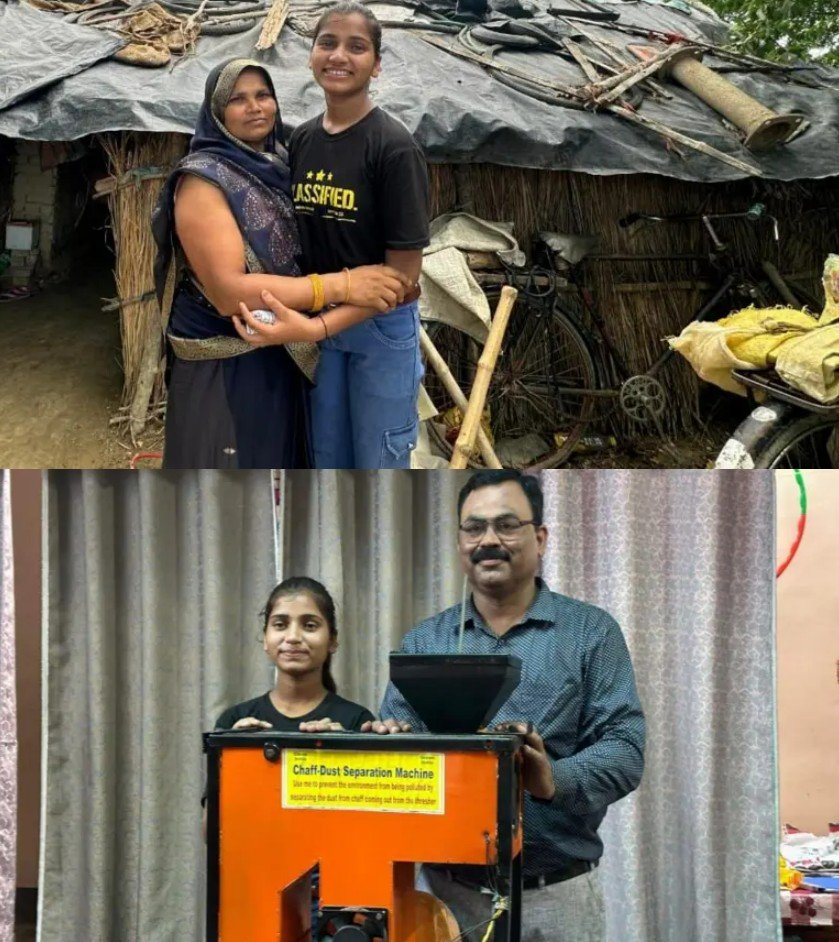Seventeen-year-old Pooja, hailing from a modest village in Uttar Pradesh, has become a national symbol of scientific talent. Living in a hut covered with tarpaulin and thatch, her journey from rural obscurity to international acclaim is a testament to resilience and innovation.
Recently returning from Japan, Pooja represented India as one of the 60 winners of the INSPIRE Award MANAK (Innovation in Science Pursuit for Inspired Research), a central government initiative to promote scientific temper among school students.
Her groundbreaking innovation—a dust-free thresher model—is currently in the process of being patented by India’s Ministry of Science and Technology. This device separates dust particles released during grain threshing, significantly reducing health risks for farmers and laborers.
The idea struck her four years ago when she was a student in Class 8 at the Upper Primary School in Agehra village. Dust from a nearby thresher would often enter her classroom, disrupting both lessons and breathing. One day, after watching her mother sift flour at home, she had a flash of inspiration. She approached her science teacher, Rajeev Srivastava, with the idea of filtering thresher dust similarly.
With her teacher’s support, Pooja developed a rough sketch, followed by a prototype made from paper and wood. Later, the final model was built using metal sheets and welding tools. The machine, now named “Bhoosa-Dhool Prithakkaran Yantra”, filters out fine dust particles and airborne contaminants that affect respiratory health.
In 2023, this model was selected from over 700,000 entries nationwide under the INSPIRE Award MANAK scheme. Out of 441 projects chosen for the national exhibition, only 60 earned the opportunity to travel to Japan under the Sakura Science Exchange Programme. Pooja was the only student from Uttar Pradesh to make the list.
Her achievement has turned heads in her village, Dhalhipurwa, where she lives with her parents and five siblings in a small hut without a proper roof or toilet. “Whenever someone walks past our home now, they stop and say—‘This is the house of the girl who went abroad,’” Pooja says proudly.
Her father, Puttilal, works as a daily wage laborer, while her mother, Sunila, is a cook at a local government school. Despite financial hardships, the family prioritized education. “Our children might have fewer clothes, but their notebooks and books are never missing,” Sunila says.
She recalls how villagers once criticized Pooja for being “too playful,” but today they praise her endlessly. “We used to hear taunts suggesting we send our children to plant rice. But we’d fold our hands and say—let us eat just salt and bread, but our children won’t labor in fields.”
Pooja currently studies in Class 12 at Jagdish Chandra Fatehraj Inter College. She dreams of supporting her family financially in the future. “My home still floods during the rains. We used to study by a dim oil lamp, but now we have a small battery light. I never imagined that one day I’d go from Dhalhipurwa to Japan,” she says with a smile.
Her science teacher, Rajeev Srivastava, emphasized how the INSPIRE scheme encourages innovation by granting ₹10,000 for prototype development. “No matter how far a student goes, the idea always remains theirs,” he noted.
The program, launched in 2006 by the Department of Science and Technology, is now open to students from Classes 6 to 12. Interested students can submit a 150- to 300-word synopsis identifying a real-world problem and proposing a solution.
Dr. Dinesh Kumar, Science Progress Officer of Lucknow Division, confirmed that applications are now open, with the deadline set for September 15, 2025.
As for Pooja’s future, she aspires to secure a job that will ease her family’s burdens. Her father sums it up best: “People say I sent my daughter to Japan with my daily labor. That alone makes my life’s hard work worth it. What more could a laborer ask for?”








